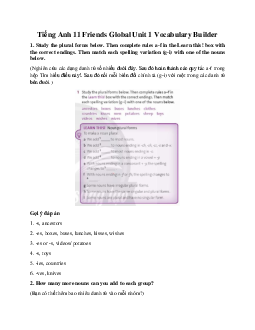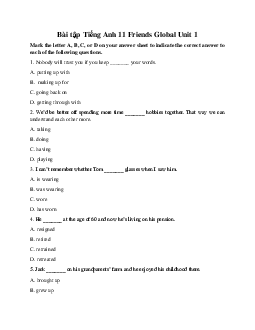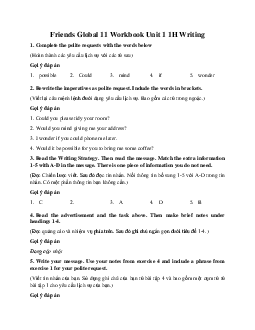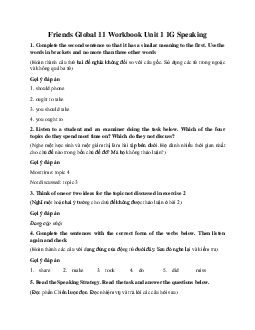





Preview text:
Tiếng Anh 11 Unit 1: 1F Reading Bài 1
SPEAKING Do you sometimes argue with your parents? What do you argue
about, and why? Use the ideas below to help you.
(Bạn có đôi khi tranh cãi với cha mẹ của bạn? Bạn tranh luận về điều gì, và tại sao?
Sử dụng những ý tưởng dưới đây để giúp bạn.)
- bedtime (giờ đi ngủ) - clothes (quần áo)
- going out with friends (đi chơi với bạn)
- homework (bài tập về nhà)
- housework (việc nhà)
- staying up late (thức khuya)
- using computers or tablets (sử dụng máy tính hoặc máy tính bảng) Gợi ý đáp án
I hardly argue with my parents about anything because my mother always understands
and shares everything with me. But in the past, I remember that I used to argue with
my father about my bedtime. I am a night owl; I can only concentrate on my studying
at night so I don't want to go to bed early. By contrast, my father wanted me to go to
bed before 10:00 PM. As a result, I had to share the reason why I wanted to stay up
late and luckily, he understood and let me do everything I wanted. Bài 2
Read the text quickly, ignoring the gaps. Choose the best summary of the text: a, b or c.
(Đọc văn bản một cách nhanh chóng, bỏ qua những khoảng trống. Chọn tóm tắt tốt
nhất của văn bản: a, b hoặc c.)
a. Parents may find it difficult to understand their adolescent children, but it is a
parent's duty to communicate properly with them and avoid arguments.
b. Although teenagers develop new ideas, values and beliefs during adolescence, that
is no excuse for bad behaviour. They should listen to their parents.
c. Teenagers experience big physical and emotional changes during adolescence. It's
important to communicate with your parents and try to understand their point of view.
HOW TO HANDLE YOUR PARENTS
Adolescence is a difficult time for both parents and teenagers as it is a period of
physical, social and emotional changes. Physically, as a dependent pre-teen child, you
are being transformed into an independent young adult. 1____________
First, you want more freedom to choose who to see and when. You used to be most
happy in the company of your parents. Now you want to spend some more time on
your own. Second, your parents made most decisions before adolescence. But now
you want to decide things for yourselves. 2____________. Above all, adolescents
have strong opinions and are idealistic. 3____________. You feel you have all the answers while adults don't.
All these perfectly normal changes will affect teenagers' relationship with parents. So
what can you, as adolescents, do to stay on good terms with your parents?
4____________. Secondly, try to agree rules and boundaries and prove to be
dependable. Keep your words and stick to rules.
Thirdly, try to understand why they might be irritated by your behaviour. Show your
parents that you are capable of an independent life by taking care of your own school
work and maintaining a healthy lifestyle. Finally, it's all about communication!
5____________. The more disconnected they feel, the more critical, distrustful and
controlling they tend to become. Gợi ý đáp án
Chọn C: Teenagers experience big physical and emotional changes during
adolescence. It's important to communicate with your parents and try to
understand their point of view.
Thông tin: Physically, as a dependent pre-teen child, you are being transformed into
an independent young adult…Finally, it's all about communication! 5____________.
The more disconnected they feel, the more critical, distrustful and controlling they tend to become. Bài 3
Read the Reading Strategy. Then read the sentences below and the highlighted
words in the text. Say which sentence links to which highlighted word and
underline the part of the sentence which helped you to decide.
(Đọc Chiến lược đọc. Sau đó đọc các câu dưới đây và các từ được đánh dấu trong
văn bản. Nói câu nào liên kết với từ được tô đậm và gạch dưới phần của câu đã giúp bạn quyết định.)
A. You see the world differently, develop your own views and your own sense of right and wrong.
B. They may not say so, but they are probably feeling a sense of loss and may even feel rejected by you.
C. Firstly, let your prents know that you still love and value them.
D. Keep talking to your parents.
E. In general, emotionally and socially, the adolescents like you are experiencing
profound changes interms of freedom, privacy, interests, decisions and opinions.
F. You hate being told what to do all the time.
G. Despite this, you should always listen carefully. Gợi ý đáp án A. opinions and B. C. secondly D. idealistic communication communication E. physically F. made decision G. made decision Bài 4
Use your answers to exercise 3 to match sentences A-G with gaps 1-5 in the text.
There are two extra sentences.
(Sử dụng câu trả lời của bạn cho bài tập 3 để nối các câu từ A-G với các khoảng
trống từ 1-5 trong văn bản. Có hai câu bị thừa.) Gợi ý đáp án 1. E 2. F 3. A 4. C 5. D Bài 5
VOCABULARY Complete the stems to make a noun and an adjective. Use a
dictionary to help you. Either the noun or the adjective is in the text. (Sometimes
you do not need to add anything.)
(Hoàn thành các từ để tạo thành một danh từ và một tính từ. Sử dụng từ điển để giúp
bạn. Danh từ hoặc tính từ có trong văn bản. (Đôi khi bạn không cần thêm bất cứ thứ gì.)) 1. adolescence, adolescent
(thời niên thiếu, thanh thiếu niên) Gợi ý đáp án 1.
adolescence (n): thời niên thiếu
adolescent (n): thanh thiếu niên 2.
dependent (adj): phụ thuộc
dependence (n): sự phụ thuộc 3. private (adj): riêng tư privacy (n): sự riêng tư 4. emotion (n): cảm xúc
emotional (adj): thuộc về cảm xúc 5. critic (n): nhà phê bình critical (adj): phê bình 6.
distrustful (adj): không tin tưởng Bài 6
SPEAKING KEY PHRASES Work in pairs or small groups. Discuss points 1
and 2, using the phrases below to help you. Share your ideas and opinions with the class.
(CÁC CỤM TỪ CHÍNH Làm việc theo cặp hoặc nhóm nhỏ. Thảo luận điểm 1 và 2, sử
dụng các cụm từ dưới đây để giúp bạn. Chia sẻ ý kiến và quan điểm của bạn với cả lớp.)
1. Look at the five social and emotional changes that the writer describes in the text
(freedom, privacy, interests, decisions and opinions). Discuss them one by one. Which
ones affect teenagers most, do you think? Give examples.
2. Look at the advice offered by the writer. Is it good advice on the whole, do you
think? Which is the best piece of advice? Give reasons. Gợi ý đáp án 1.
There are five social and emotional changes that the writer describes in the text
(freedom, privacy, interests, decisions, and opinions). Firstly, adolescents always want
to see and make friends with those they want because they think they are mature
enough to do that. Secondly, about privacy, They tend to spend less time with their
family than before since they think they have many more important things to solve
than focus on their home. Next, making decisions is a sensitive problem that parents
find hard to deal with. They like doing things on their way without thinking carefully.
Finally, the opinions between adults and adolescents are also different. In my
experience, Because of the generation gap, our parents understand what we are
thinking. Personally, I think that opinions affect teenagers most because it is the stage
they change from teen to adult, their point of view will change, too. For example, if
adolescents aren’t well-educated, they may try smoking and drinking alcohol because
they think it will help them prove they are cool and mature. It will bring a lot of negative effects. 2.
In my opinion, the advice offered by the writer is useful and realistic. I think the best
piece of advice is about communication. I totally agree that communication is the key
to make teenagers and their parents understand each other. No matter how old you are,
family is always your home, and you should share every happiness and sorrow. For
instance, even when you go to work from the early morning until midnight, you ought
to spend at least 30 minutes every day talking with your mom or your dad about your
work, your feelings. That is not responsibility, that is to make your parents trustful and sympathetic.




